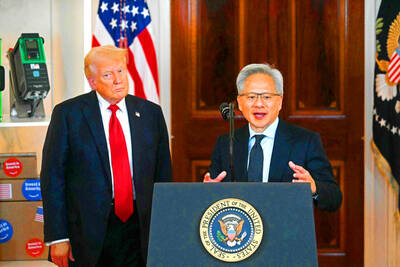Philippine President Ferdinand Marcos Jr yesterday signed into law a measure that imposes a 12 percent value-added tax on foreign-based firms providing digital services in the country.
The tax applies to a vast range of products and services including search engines, software licensing, mobile apps, online games, Webinars, music, advertising, warehousing and cloud services, Web site hosting and electronic marketplaces.
“Whether you are a small tech start-up or a global tech giant based halfway around the world, if you are making money here in the Philippines, you are part of our community,” Marcos said in a speech at a signing ceremony attended by legislators.

Photo: EPA-EFE
“Local businesses and international digital platforms now compete on equal terms. We no longer will be playing by different sets of rules,” he said.
Failure to pay the tax would lead to the suspension of business operations in the Philippines.
Philippine Senate President Francis Escudero said the law plugs a tax revenue loophole caused by the “vagueness” of existing laws pertaining to taxation of e-commerce transactions, particularly foreign-based companies that provide services to local consumers.
Other countries have been imposing the same tax on digital services and transactions now that their consumption has become almost universal, Escudero said in a statement.
The law exempts educational services such as online courses and Webinars provided by privately owned schools.
Marcos said the government expects to raise 105 billion pesos (US$1.87 billion) in tax revenue over the next five years to be used to build thousands of school classrooms, rural health clinics and rural roads.
Five percent of the revenues would be allocated to creative industries in the Philippines, including artists, filmmakers and musicians.

Taiwan Semiconductor Manufacturing Co (TSMC, 台積電) last week recorded an increase in the number of shareholders to the highest in almost eight months, despite its share price falling 3.38 percent from the previous week, Taiwan Stock Exchange data released on Saturday showed. As of Friday, TSMC had 1.88 million shareholders, the most since the week of April 25 and an increase of 31,870 from the previous week, the data showed. The number of shareholders jumped despite a drop of NT$50 (US$1.59), or 3.38 percent, in TSMC’s share price from a week earlier to NT$1,430, as investors took profits from their earlier gains

AI TALENT: No financial details were released about the deal, in which top Groq executives, including its CEO, would join Nvidia to help advance the technology Nvidia Corp has agreed to a licensing deal with artificial intelligence (AI) start-up Groq, furthering its investments in companies connected to the AI boom and gaining the right to add a new type of technology to its products. The world’s largest publicly traded company has paid for the right to use Groq’s technology and is to integrate its chip design into future products. Some of the start-up’s executives are leaving to join Nvidia to help with that effort, the companies said. Groq would continue as an independent company with a new chief executive, it said on Wednesday in a post on its Web

CHINA RIVAL: The chips are positioned to compete with Nvidia’s Hopper and Blackwell products and would enable clusters connecting more than 100,000 chips Moore Threads Technology Co (摩爾線程) introduced a new generation of chips aimed at reducing artificial intelligence (AI) developers’ dependence on Nvidia Corp’s hardware, just weeks after pulling off one of the most successful Chinese initial public offerings (IPOs) in years. “These products will significantly enhance world-class computing speed and capabilities that all developers aspire to,” Moore Threads CEO Zhang Jianzhong (張建中), a former Nvidia executive, said on Saturday at a company event in Beijing. “We hope they can meet the needs of more developers in China so that you no longer need to wait for advanced foreign products.” Chinese chipmakers are in

POLICY REVERSAL: The decision to allow sales of Nvidia’s H200 chips to China came after years of tightening controls and has drawn objections among some Republicans US House Republicans are calling for arms-sale-style congressional oversight of artificial intelligence (AI) chip exports as US President Donald Trump’s administration moves to approve licenses for Nvidia Corp to ship its H200 processor to China. US Representative Brian Mast, the Republican chairman of the US House Committee on Foreign Affairs, which oversees export controls, on Friday introduced a bill dubbed the AI Overwatch Act that would require the US Congress to be notified of AI chips sales to adversaries. Any processors equal to or higher in capabilities than Nvidia’s H20 would be subject to oversight, the draft bill says. Lawmakers would have